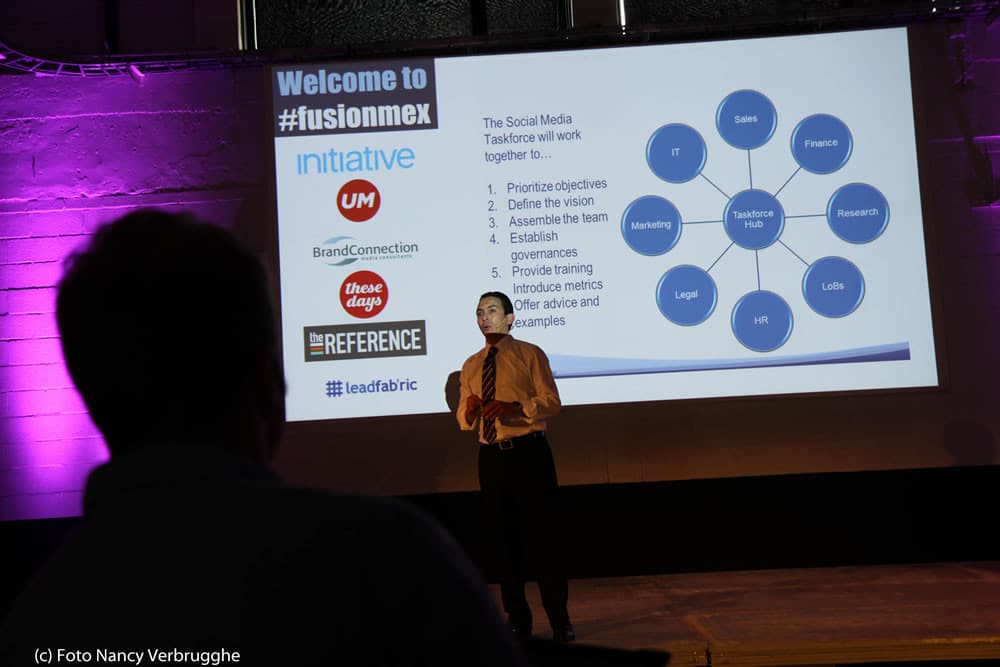Earlier this week, StrongMail organized a webinar with Brian Solis, author of Engage!, in which Solis shared his vision on listening, engagement and social media marketing.

The fact that StrongMail organized this webinar is not a coincidence. The company profiles itself more and more as an important player in the field of integrating social media and email, and launched a variety of applications in the last six months, many of which can even be used separately from the email marketing platform.
The webinar with Brian Solis lasted for about an hour and I was listening along. You’ll find Solis’ presentation at the bottom of this post (the slideshare was posted yesterday so it’s still shiny and fresh).
Brian Solis started out saying that, if a conversation takes place online, and you’re not there, it never happened. With “being there” he doesn’t literally mean “participating”, but he does mean listening, measuring, etc.
Online conversations take place all the time. Brian Solis’ message to marketers is to learn what to do to earn relevance, by listening, paying attention, and monitoring the conversations. However, there is more to it, as you can read below.
Social media bring conversations to the surface
Businesses, in reality, have little control over communication and even their brand. It’s not about what we as marketers think is relevant or important, but about what others – people, prospects, and customers – say and feel.
Brian Solis adds that social media isn’t the source of conversations, but they simply brought them to the surface. It’s up to us to monitor those “conversation clouds”.
Of course, listening by itself is not enough. Solis provided the example of an airline company, which at one time was “spoken of” very negatively in online conversations; creating just as much negative impact for the company’s reputation.
Situations like these don’t have to be catastrophic, but Solis also looked at all social media presences of the airline company, and concluded that it did not answer proactively in any way or even participated in the ongoing conversations at that moment.
When Solis states that we as companies do not have the control, he does not mean that we’re completely powerless. On the contrary: by listening, participating, and acting in the right way, we can influence the course of online conversations by facilitating and embracing them. This is exactly what didn’t happen in the example he mentioned, and – let’s face it – also rarely happens at other companies.
Social media and reputation
Solis mentions that with social media, it’s not only about the possibility to engage with people or about interacting with them. The example of the airline company clearly points out just what it’s all about in the end: reputation, perceived value and trust.
 Time to bring in the brand. The opinion and voice of the social media user can ruin a company’s reputation that’s often built up through years of hard work, in just one event. So, whoever doesn’t listen to online conversations, doesn’t participate in them proactively, and doesn’t monitor what is going on, will effectively lose all control over his brand reputation.
Time to bring in the brand. The opinion and voice of the social media user can ruin a company’s reputation that’s often built up through years of hard work, in just one event. So, whoever doesn’t listen to online conversations, doesn’t participate in them proactively, and doesn’t monitor what is going on, will effectively lose all control over his brand reputation.
It’s not so much about an individual person and what he says about his brand experience to another person. Word-of-mouth has always been around, by the way.
However, in these times of social media marketing, people expand their online influences. They network, participate in communities or form their own, get “followers”, “fans”, etc.
This also increases the scale of negative conversations about a brand and the exact reason why you can’t afford to stay at the sidelines without even listening to online conversations and respond to them.
Channels like Twitter of Facebook are not what matters in social media marketing. The way in which, you listen, learn, adapt, respond and act in real-time, however, is.
Social media and detecting opportunities
You might get the impression that it’s all about crisis communication, “negative” buzz and reputation management. However, this is not the case. Solis rightfully advocates that companies identify problems before they develop into a crisis.
And just when do they become a crisis? Exactly: when you don’t monitor what’s being said about your brand on blogs, social networks, etc. and learn in time just where the opportunities and challenges lie.
Furthermore, as a company you can get a head start by effectively inviting people to converse and by participating in these conversations. We can detect opportunities through social media to generate leads or to close a deal.
In conclusion, it all comes down to this: listening and monitoring are crucial. However, it’s just a first step. The most important thing is what you DO with the information and the opportunities you receive by engaging in online conversations. Act and interact. Or as the title of Solis’s book says: Engage!
Note: this post only sums up the first four minutes of the webinar, which lasted an hour…

